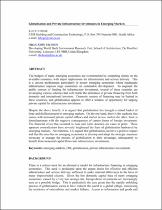JavaScript is disabled for your browser. Some features of this site may not work without it.
- ResearchSpace
- →
- Research Publications/Outputs
- →
- Conference Publications
- →
- View Item
| dc.contributor.author |
Chege, L

|
|
| dc.contributor.author |
Ebohon, OJ

|
|
| dc.date.accessioned | 2008-01-22T11:37:45Z | |
| dc.date.available | 2008-01-22T11:37:45Z | |
| dc.date.issued | 2004-11 | |
| dc.identifier.citation | Chege, L, and Ebohon, OJ. Globalisation and private infrastructure investments in emerging markets. CIB 2004 International Symposium on Globalisation and Construction , Bangkok, Thailand, 2004, pp. 1-8 | en |
| dc.identifier.uri | http://hdl.handle.net/10204/1914 | |
| dc.description.abstract | The budgets of many emerging economies are overstretched by competing claims on the available resources, with major implications for infrastructure and service delivery. This is a serious predicament particularly in poorer emerging economies where inadequate infrastructure imposes huge constraints on sustainable development. To augment the public sources of funding for infrastructure investment, several of these countries are developing various schemes that will enable the utilization of private financing from both domestic and international investors. Domestic sources of financing may be limited in these countries, and globalisation appears to offer a window of opportunity for tapping private capital for infrastructure investment. Despite the above benefit, it is argued that globalisation has brought a mixed basket of hope and disillusionment to emerging markets. On the one hand, there is the euphoria that comes with increased private capital inflows and market access, and on the other, there is disenchantment with the negative consequences of certain forms of foreign investment. The financial crises that occurred in Asia and Latin America are cases in point. These apparent contradictions have severely heightened the fears of globalisation harboured by emerging markets. Nevertheless, it is argued that globalisation can have a positive impact and that the onus lies on emerging economies to develop and adopt the strategic measures necessary to manage the process of globalisation to their advantage, subsequently | en |
| dc.language.iso | en | en |
| dc.subject | Emerging markets | en |
| dc.subject | FDI | en |
| dc.subject | Globalisation | en |
| dc.subject | Private infrastructure investments | en |
| dc.title | Globalisation and private infrastructure investments in emerging markets | en |
| dc.type | Conference Presentation | en |
| dc.identifier.apacitation | Chege, L., & Ebohon, O. (2004). Globalisation and private infrastructure investments in emerging markets. http://hdl.handle.net/10204/1914 | en_ZA |
| dc.identifier.chicagocitation | Chege, L, and OJ Ebohon. "Globalisation and private infrastructure investments in emerging markets." (2004): http://hdl.handle.net/10204/1914 | en_ZA |
| dc.identifier.vancouvercitation | Chege L, Ebohon O, Globalisation and private infrastructure investments in emerging markets; 2004. http://hdl.handle.net/10204/1914 . | en_ZA |
| dc.identifier.ris | TY - Conference Presentation AU - Chege, L AU - Ebohon, OJ AB - The budgets of many emerging economies are overstretched by competing claims on the available resources, with major implications for infrastructure and service delivery. This is a serious predicament particularly in poorer emerging economies where inadequate infrastructure imposes huge constraints on sustainable development. To augment the public sources of funding for infrastructure investment, several of these countries are developing various schemes that will enable the utilization of private financing from both domestic and international investors. Domestic sources of financing may be limited in these countries, and globalisation appears to offer a window of opportunity for tapping private capital for infrastructure investment. Despite the above benefit, it is argued that globalisation has brought a mixed basket of hope and disillusionment to emerging markets. On the one hand, there is the euphoria that comes with increased private capital inflows and market access, and on the other, there is disenchantment with the negative consequences of certain forms of foreign investment. The financial crises that occurred in Asia and Latin America are cases in point. These apparent contradictions have severely heightened the fears of globalisation harboured by emerging markets. Nevertheless, it is argued that globalisation can have a positive impact and that the onus lies on emerging economies to develop and adopt the strategic measures necessary to manage the process of globalisation to their advantage, subsequently DA - 2004-11 DB - ResearchSpace DP - CSIR KW - Emerging markets KW - FDI KW - Globalisation KW - Private infrastructure investments LK - https://researchspace.csir.co.za PY - 2004 T1 - Globalisation and private infrastructure investments in emerging markets TI - Globalisation and private infrastructure investments in emerging markets UR - http://hdl.handle.net/10204/1914 ER - | en_ZA |






